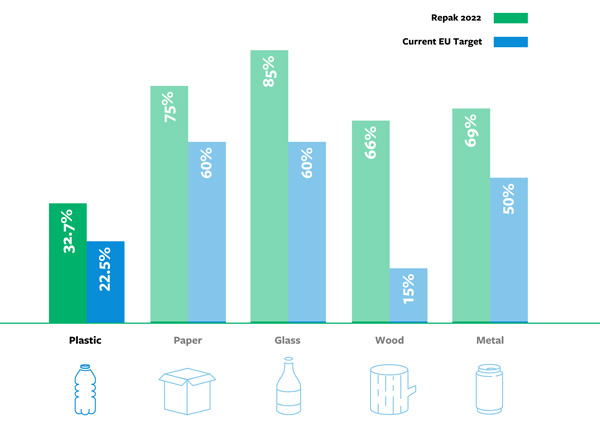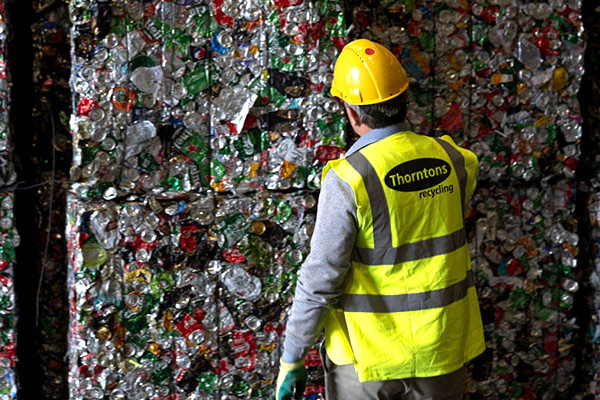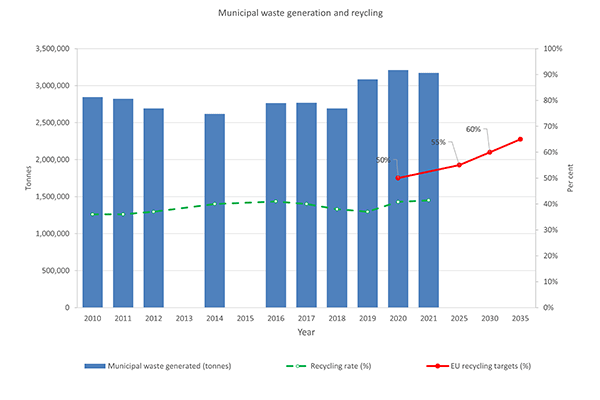The Importance of Separating Paper Waste
Proper waste segregation is essential for effective recycling and sustainability efforts. One of the critical materials that require careful separation is paper.
The Importance of Separating Paper Waste
In this blog post, we’ll discuss the importance of separating paper waste to (a) reduce contamination of recyclables, (b) recover paper waste for recycling into new products, and (c) decrease the need for tree harvesting.
Reducing Contamination of Recyclables
Contamination is a significant issue in the recycling process. When paper waste is mixed with non-recyclable materials or food waste, it can contaminate the entire batch, making it difficult to recycle.
Impact of Contamination:
- Quality Degradation: Contaminated paper lowers the quality of recycled paper products.
- Increased Costs: Additional sorting and cleaning processes are required to remove contaminants, increasing operational costs.
- Landfill Overflow: Contaminated recyclables often end up in landfills, contributing to waste management challenges.
In Ireland, contamination rates are a concern. While the country has made significant strides in recycling, maintaining high-quality streams of recyclable paper is essential to improve overall efficiency (Home) (Repak).
Recovering Paper Waste for Recycling into New Products
Proper segregation of paper waste ensures that these materials can be efficiently processed and recycled into new products. This is crucial for sustaining a circular economy where materials are reused and repurposed.
Benefits of Recycling Paper:
- Resource Efficiency: Recycling paper conserves natural resources by reusing fibres.
- Energy Savings: The process of recycling paper uses less energy compared to producing new paper from raw materials.
- Environmental Protection: By recycling paper, we reduce the need for landfills and decrease pollution associated with paper production.
In 2021, Ireland achieved a paper recycling rate of 75%, showcasing the potential of effective paper waste segregation (Repak) (TheJournal).

Reducing the Need for Tree Harvesting
One of the most significant benefits of recycling paper is the reduction in the demand for new paper, which directly impacts tree harvesting. By recycling paper, we can help conserve forests and protect biodiversity.
Advantages of Reducing Tree Harvesting:
- Conservation of Forests: Reducing the demand for new paper helps preserve forests, which are vital for maintaining ecological balance.
- Lower Carbon Footprint: Trees absorb carbon dioxide, and by conserving forests, we help mitigate climate change.
- Biodiversity Protection: Forests are home to a wide variety of species. Reducing tree harvesting helps protect these habitats.
Ireland’s commitment to recycling paper contributes significantly to forest conservation efforts. By recycling more paper, we can reduce the pressure on forests and promote sustainable forestry practices (Central Statistics Office) (Repak).
Steps to Proper Paper Waste Segregation
- Identify and Separate: Clearly distinguish between different types of paper (e.g., office paper, newspapers, cardboard) and ensure they are separated from other waste streams.
- Keep It Clean and Dry: Ensure paper waste is free from food residues and other contaminants.
- Use Proper Bins: Utilise bins specifically designated for paper to avoid cross-contamination with other recyclables.
- Educate and Encourage: Raise awareness among household members and the community about the importance of proper paper waste segregation.
Conclusion
Separating paper waste is a vital practice that contributes to reducing contamination, recovering valuable materials for recycling, and decreasing the demand for new paper. Ireland’s progress in paper recycling highlights the importance of continued efforts in waste segregation. By participating in the ‘Sort It’ campaign, we can collectively work towards a more sustainable and environmentally-friendly future.
The Importance of Separating Plastic Waste
Proper waste segregation is a cornerstone of effective recycling programs. One of the most significant materials that require careful sorting is plastic. In this blog post, we’ll discuss the importance of separating plastic waste to (a) reduce contamination of recyclables, (b) recover plastic waste for recycling into new products, and (c) reduce the amount of new plastic needed.
Reducing Contamination of Recyclables
Contamination is a major hurdle in the recycling process. When plastics are not properly separated, they can contaminate other recyclable materials, making them less valuable and more difficult to recycle.
Impact of Contamination:
- Quality Degradation: Mixed materials can reduce the quality of recyclable items, leading to a higher rejection rate at recycling facilities.
- Increased Processing Costs: Contaminated recyclables require more extensive sorting and cleaning, increasing operational costs.
- Landfill Overflow: High contamination rates mean that more recyclables end up in landfills, exacerbating waste management issues.
In Ireland, the recycling rate for plastics is currently at 32.7%, which, while above the EU target of 22.5%, still indicates a need for better separation practices to improve overall recycling efficiency (Repak) (TheJournal).

Recycling Targets Ireland vs EU
Recovering Plastic Waste for Recycling into New Products
Proper segregation of plastic waste ensures that these materials can be efficiently processed and recycled into new products. This is crucial for creating a circular economy where materials are reused and repurposed.
Benefits of Recycling Plastic:
- Resource Efficiency: Recycling plastics saves raw materials and reduces the need for virgin plastic production.
- Energy Savings: The process of recycling plastics typically consumes less energy compared to producing new plastics from scratch.
- Environmental Protection: By recycling plastics, we reduce the pollution associated with plastic production and disposal.
In 2021, Ireland recycled 104,016 tonnes of plastic, contributing to a more sustainable management of plastic waste (Repak).
Reducing the Need for New Plastic
One of the most significant benefits of effective plastic recycling is the reduction in the demand for new, virgin plastic. This has multiple environmental and economic benefits.
Advantages of Reducing New Plastic Production:
- Conservation of Resources: Reducing the need for new plastic conserves fossil fuels and other natural resources used in plastic production.
- Lower Carbon Footprint: The production of new plastics is a significant source of greenhouse gas emissions. Recycling plastics helps mitigate this impact.
- Economic Savings: Using recycled plastic in manufacturing can be more cost-effective than using virgin materials, leading to savings for businesses and consumers.
Steps to Proper Plastic Waste Segregation
- Identify and Separate: Clearly distinguish between different types of plastics and ensure they are separated from other waste streams.
- Clean and Dry: Rinse plastic containers to remove food residues and let them dry before placing them in the recycling bin.
- Use Proper Bins: Utilize bins specifically designated for plastics to avoid cross-contamination with other recyclables.
- Educate and Encourage: Raise awareness among household members and the community about the importance of proper plastic waste segregation.
The Importance of Separating Food Waste — Reducing Contamination and Enhancing Composting
Proper waste segregation is a critical aspect of effective waste management. One of the most significant components of this process is the separation of food waste. In this blog post, we will explore how separating food waste can (a) reduce contamination of recyclables and (b) recover food waste for composting, contributing to a more sustainable environment.
Reducing Contamination of Recyclables
When food waste is mixed with recyclables, it can contaminate the entire batch. This contamination makes it difficult, if not impossible, to recycle these materials effectively. Contaminated recyclables often end up in landfills, defeating the purpose of recycling programs.
Impact of Contamination:
- Quality Reduction: Food residues can degrade the quality of recyclable materials, making them less suitable for processing.
- Increased Costs: Contaminated recyclables require additional sorting and cleaning, increasing the costs for recycling facilities.
- Landfill Overflow: Contaminated recyclables often end up in landfills, contributing to waste management challenges.
Recovering Food Waste for Composting
Separating food waste not only reduces contamination but also allows for the recovery of organic materials for composting. Composting is an environmentally friendly way to manage food waste, turning it into valuable compost that can enrich soil and support agriculture.
Benefits of Composting:
- Soil Health: Compost adds essential nutrients to the soil, improving its fertility and structure.
- Reduced Greenhouse Gases: Composting organic waste reduces methane emissions from landfills, a potent greenhouse gas.
- Resource Conservation: Using compost reduces the need for chemical fertilizers, conserving natural resources.
In Ireland, approximately 750,000 tonnes of food waste were generated in 2022. Composting facilities accepted around 590,000 tonnes of organic waste for treatment, showcasing the potential of composting in managing food waste effectively.
Steps to Proper Food Waste Segregation
- Set Up Separate Bins: Use dedicated bins for food waste, recyclables, and general waste.
- Educate Household Members: Ensure everyone in the household understands the importance of separating food waste.
- Use Compostable Bags: Line your food waste bin with compostable bags to make the process cleaner and easier.
- Compost at Home: If possible, set up a composting system at home to manage your food waste directly.
Separating food waste is a simple yet powerful step towards improving waste management. By reducing contamination of recyclables and recovering valuable organic material for composting, we can contribute to a more sustainable environment. Ireland’s progress in recycling and composting highlights the importance of continued efforts in waste segregation. Let’s all play our part in the ‘Sort It’ campaign and make a positive impact on our planet.
#SortItCampaign #FoodWaste #Composting #Recycling #Sustainability #EcoFriendly #WasteManagement #SaveThePlanet
By participating in proper waste segregation, you are not only helping to reduce landfill waste but also supporting a circular economy. Together, we can make a significant difference.
Sort It! Campaign Launch
We’re excited to launch this campaign to promote proper waste segregation and recycling. This initiative aims to raise awareness about the importance of managing waste responsibly to create a sustainable future for Ireland.

Why ‘Sort It’?
Proper waste segregation is essential for effective recycling, reducing landfill waste, and protecting our environment. When waste is sorted correctly, recyclable materials can be efficiently processed and reused, minimising environmental pollution and conserving natural resources.
Ireland’s Recycling Landscape
Despite Ireland’s strong track record in recycling, there are challenges ahead. In 2021, Ireland generated 3.17 million tonnes of municipal waste, with a recycling rate of 41% for this waste stream. Packaging waste recycling rates stood at 58%, a decrease from previous years.
Key Statistics:

- Glass Recycling: 85%
- Paper Recycling: 75%
- Plastic Recycling: 32.7%
- Metal Recycling: 69%
- Wood Recycling: 66% (Repak).
While these rates are impressive, there is still room for improvement, especially in meeting the EU’s future recycling targets. Ireland aims to recycle 50% of all plastics by 2025 and 55% by 2030 (TheJournal).
What to Expect
Over the next three months, we will share informative posts, tips, and success stories to help you become more recycling proactive. From understanding recycling symbols to learning how to compost, we’ve got a range of topics lined up to empower you with knowledge and practical advice.
Join Us in Making a Difference
Together, we can create a cleaner, greener future. Follow our campaign, share your recycling tips, and let’s sort it out for a sustainable tomorrow!
Get Involved:
- Follow Us: Stay updated with our latest posts and tips.
- Share Your Story: Use the hashtag #SortItCampaign to share your recycling journey.
- Spread the Word: Encourage your friends and family to join the campaign.
#SortItCampaign #RecycleRight #WasteManagement #GoGreen #EcoFriendly #ReduceReuseRecycle #SaveThePlanet #ZeroWaste
By participating in the ‘Sort It’ campaign, you are taking a step towards a more sustainable future. Let’s work together to make a significant impact on our environment!